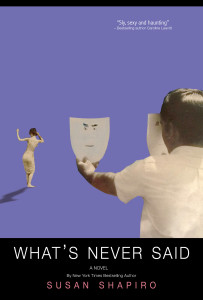Susan Shapiro is an award winning writing professor at The New School. She’s written for the New York Times, Wall Street Journal, Los Angeles Times, Washington Post, Salon and Tin House. She’s the New York Times bestselling author of 10 books including “Five Men Who Broke My Heart,” “Lighting Up,” the coauthored memoir “The Bosnia List” and the new novel “What’s Never Said.” You can follow her on Twitter at @susanshapironet
<1>
MEREDITH: Where you find yourself scared and paralyzed, either of something you are writing, of revealing yourself through the work, or for any other reason, how do you start moving again? And by moving I mean forward, not backwards, as in retreating?
SUSAN: Early on I had trouble writing and publishing on my own and put certain systems into place to help me have more confidence and be more productive. This included weekly therapy with a great shrink who was one of my “core pillars.” I’ve written about this in my memoirs Lighting U p and Only As Good as Your Word. At this point I have a great spouse who is also a writer, two very supportive critical weekly writing workshops filled with colleagues I love and admire, and classes I teach two nights a week. That pretty much saves my life and my work.
p and Only As Good as Your Word. At this point I have a great spouse who is also a writer, two very supportive critical weekly writing workshops filled with colleagues I love and admire, and classes I teach two nights a week. That pretty much saves my life and my work.
<2>
TH: Some people refer to their creations as their children. Some view them as entities entirely separate from themselves. Sometimes it feels to me like our creations are more as an extension of our own biology. In other words, our words are who we are, just expressed in an alternate form (kind of like how water freezes to ice and then melts and flows again). How do you view your creations and how did you come to seeing them this way?
SUSAN: I definitely call my books “my babies.” They’ve given me a lot of joy -tinged with worry and angst. Though I also think of my students in a maternal way too. A mentor once told me “Every book will break your heart in a different way.” That’s true too.
<3>
MEREDITH: When you are in the middle of a project that feels the equivalent of crossing the Atlantic Ocean in a bathtub and the only thing you can do is row (put pen to paper, fingers to keyboard), how to you nurture yourself/support yourself when there are no signs that offer feedback because it’s too soon for feedback and the only thing you are supposed to do at that moment is to keep rowing?
SUSAN: Again, I’m lucky to have my writing workshops, therapy, a wonderful spouse and teaching jobs – which all fuel and feed me. I also sometimes hire ghost editors to help me with book projects. I’ve mostly use former agents and book editors. I can recommend some great ones. They’re almost always right.
<4>
MEREDITH: You’re in the hub of many writerly-literary relationships, and a very generous supporter of many writers. How does cultivating a writerly community fuel your writing? Does it provide a charge? Is there ever negative energy associated with it? An energy drain?
SUSAN: It provides a big charge. I love writing alone all day and then going out to teach big exciting classes at night. It keeps me young. I also love my two writing workshops. They give me deadlines and help structure my life.
Yes there’s been negative energy, before I had good boundaries. I wrote a piece for the Modern Jewish Girl’s Guide to Guilt called Quitting Guilt which started “I spent the last two years saying no.” And in those two years I got everything I wanted in life.
I had a brilliant addiction specialist who helped me quit cigarettes, alcohol, dope, gum and bread. He’s the coauthor of my bestselling addiction book “Unhooked.” He helped me get a rigid schedule together that really works for me. I wake up and write seven days a week, usually from 9 to 5 pm. Then I go teach. Then if I have any more energy I go out. I basically quit my social life – and say no to going out to breakfast, lunch, dinner and many social plans and out of town events. It just started taking too much of my energy and I wasn’t enjoying it. I was doing it for other people, not getting the time I needed for myself, my work and my husband, then I felt resentful. So now I let go of pleasing anyone else. My shrink once told me “You’ll never get anything from an unhappy person. They need all their energy. You’d get more from a stranger who is happy.”
Interestingly I’m so much happier and more successful now. I actually have way more to give. Though it has to be on my schedule.
<5>
MEREDITH: Taking the stance that creativity, creation, growth and expression are all natural states, why do we get stuck?
SUSAN: One of my mentors was an older, wildly prolific bestselling author. When I once told him I had writer’s block, he said “Plumbers don’t get plumber’s block. Don’t be self-indulgent, just get to work every day.” He also told me “a page a day is a book a year” which I found very helpful. I don’t get stuck that often anymore. Maybe that’s because I stopped pressuring myself. The writing doesn’t have to be brilliant. It just has to be on the page. That’s my job, to get it there. I have teachers, critics, agents and editors whose job it is to tell me what’s working and what isn’t. And that’s what I tell my students. I’ve published 10 books in the last 11 years. When people ask me what’s my secret to being prolific, I say “I’m not afraid to suck.” Someone in my writing workshop once came up to me and said “I can’t believe how bad your first draft was.” And I said, “you know, it’s funny. You didn’t bring in any work today and you have no books out. I brought in something brand new and rough and I’m on book ten. So maybe there’s a correlation.”
Visit Susan at http://www.susanshapiro.net
[Thanks, Susan!]
Photo by Bruno Bueno

